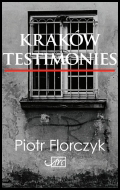 Kraków Testimonies, Piótr Florczyk
Kraków Testimonies, Piótr Florczyk
Arc Publications, 2021 £6.30
What can poetry do?
In his poem ‘In Memory of W.B.Yeats’, W.H.Auden says of poetry, ‘it survives, / A way of happening, a mouth’. Auden’s poem, written in 1939, then turns to the approaching darkness when ‘living nations wait’. What can poetry do? It can survive.
And it can do this: Kraków Testimonies gathers together poems chosen from Piotr Florczyk’s full-length collection From the Annals of Kraków, (Lynx House Press, 2020), ‘poems of witness’ to the story of Kraków’s Jews. It ‘retells their story of persecution and perseverance and luck’. Their testimonies resound. This is undoubtedly poetry as ‘mouth’.
Before he commenced writing, Florczyk watched and listened to recorded testimonies of Jewish survivors in the Visual History Archive at the USC Shoah Foundation Center, concentrating his studies on Kraków and surrounding villages. The poems have no titles, only Roman numerals. 'VI' touches on the poet’s time in the Archive:
Whose, if not mine,
are these words? Listening
is a form of speaking,
viewed from another angle, the far
corner of the room where
servers turn with the stories
of survival.
‘Listening / is a form of speaking’ — for me, these words are compelling: they connect everything. Even silence can be listened to, and there’s something especially moving about the blank page titled ‘V’ that precedes the above poem.
Hiding is also a thread that runs through. Here are lines from three poems that draw me back (taken out of order):
When is the wheat high enough
to hide in? Parting wheat en route
to freedom might attract
suspicion. No wind can part the wheat
the way a person in hiding can.
[XXIV]
When the doors were kicked in the light of day
streamed in illuminating the room the water stains
fluorescent the walls stopped closing in on us
[XIX]
(I wonder about the significance of those gaps in the lines above, although it’s the light that draws me in.)
In the following lines from ‘XVIII’, the chilling matter-of-factness of tone is arresting:
We didn’t look or speak Jewish.
But we knew we were Jewish, we small kids, we
knew, because we had to hide.
The voices of survivors ring out here unmissably. Reading, we listen.
Enid Lee